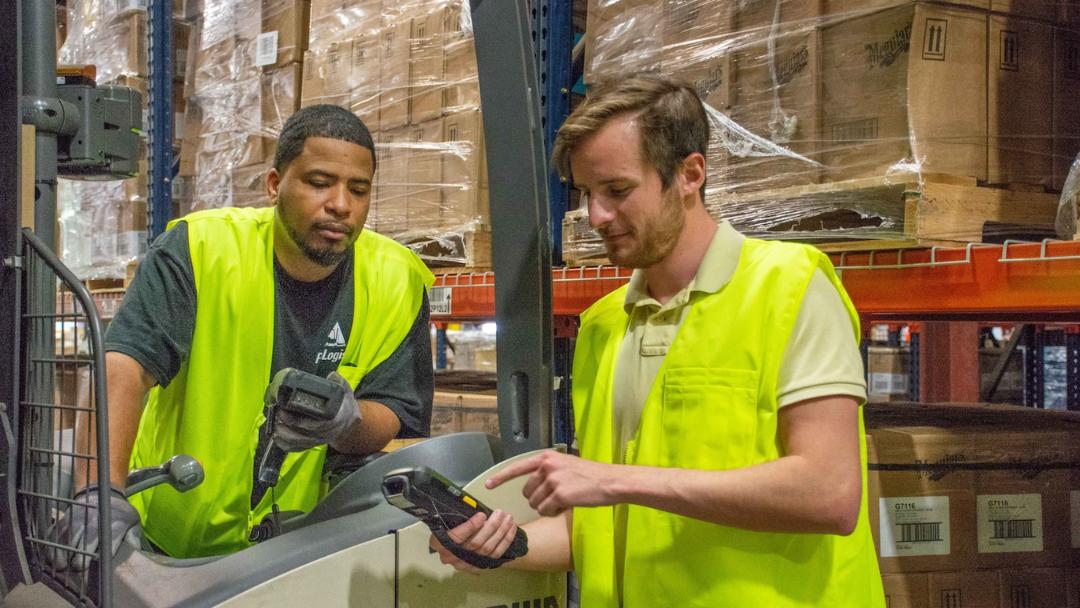Warehouse associates are the backbone of many businesses' supply chain operations. Their diligence and attention to detail directly impact inventory accuracy, order fulfillment times, and customer satisfaction. Without the hard work and dedication of warehouse associates, companies would struggle to meet the fast pace demanded by consumers.
Warehouse Associate Meaning
Warehouse associates work in a range of industries, including retail, manufacturing, food and beverage, pharmaceuticals, and e-commerce. Their roles may vary depending on the specific type of warehouse they work in, such as distribution centers, fulfillment centers, cross-docking facilities, or cold storage warehouses. Regardless of the industry or warehouse type, warehouse associates play a crucial part in ensuring that goods and materials are handled efficiently, accurately, and safely.
Warehouse Associate Responsibilities and Duties
Regardless of the industry or warehouse type, warehouse associates play a crucial part in ensuring that goods and materials are handled efficiently, accurately, and safely. Their primary responsibilities are in four areas:
Receiving and Processing Incoming Shipments
This involves unloading trucks, verifying the accuracy of shipments against purchase orders or packing slips, and inspecting for any damage or discrepancies. Proper handling, sorting, and storage of received goods are essential to maintain inventory accuracy and organization within the warehouse.
Picking, Packing, and Shipping Orders
The process of fulfilling customer orders involves retrieving the requested items from their designated storage locations, a task known as "picking." Associates must accurately identify and gather the correct products, quantities, and specifications. Once picked, orders are carefully packed, labeled, and prepared for shipment.
Inventory Management and Stock Control
Warehouse associates regularly conduct cycle counts, stock audits, and reconciliations to ensure that physical stock levels match the recorded inventory levels. This information is crucial for effective inventory management, replenishment planning, and preventing stock shortages or overages. Associates also monitor product expiration dates, rotate stock, and identify slow-moving or obsolete items.
Operating Warehouse Equipment
Most warehouse environments require associates to operate various types of equipment to move, lift, and transport goods efficiently. This includes machinery such as forklifts, pallet jacks, and conveyor systems. Proper training and certification are mandatory for operating such equipment, as well as adherence to safety protocols to prevent accidents and injuries.
Warehouse Associate Salary Outlook
Compensation for warehouse associates can vary based on the company size, industry, geographic location, and an individual's experience level. On average, warehouse associates in the United States earn an hourly wage ranging from $12 to $18 per hour, or an annual salary between $25,000 and $37,000. Those in supervisory or lead roles can command higher salaries, often ranging from $40,000 to $55,000 annually.
Factors Impacting Pay
Several factors can influence the compensation level for warehouse associates:
- Company size. Larger corporations and well-established businesses tend to offer higher wages.
- Industry. Certain industries, such as e-commerce, retail, and logistics, may pay warehouse associates more competitively due to higher demand and workloads.
- Location. Warehouse associate salaries can vary significantly based on the cost of living in different regions or states. Major metropolitan areas often have higher pay scales.
- Shift differentials. Working night shifts, weekends, or overtime can result in higher hourly rates or additional pay premiums.
- Union representation. In some cases, warehouse associates covered by union contracts may have negotiated higher wages and better benefits.
- Skills and certifications. Specialized skills, such as operating heavy machinery or possessing certifications such as forklift operation, can command higher pay.
- Job responsibilities. Warehouse associates with additional duties such as inventory management, quality control, or team leadership may earn higher compensation.
In addition to base salaries or hourly wages, many companies offer warehouse associates benefits such as health insurance, paid time off, retirement plans, and other perks, which enhance their overall compensation.
Warehouse Requirements and Qualifications
Becoming a warehouse associate typically requires a high school diploma or equivalent, such as a GED. While no formal higher education is mandatory, some employers may prefer candidates with an associate degree or certificate in areas such as logistics, supply chain management, or business administration. However, relevant work experience can often substitute for academic credentials.
Most warehouse associate positions are entry-level roles that provide on-the-job training; prior experience in warehousing, inventory management, shipping/receiving, or customer service can give job seekers a competitive edge. Familiarity with basic warehouse equipment such as forklifts, pallet jacks, and scanners is also an advantage.
Depending on the company and specific job duties, specific certifications may be required or preferred for warehouse associates. Common certifications include forklift operation, OSHA safety training, and hazardous materials handling.
Background checks and drug testing are standard requirements for most warehouse associate positions due to safety concerns and the handling of valuable inventory. A clean criminal record and the ability to pass a drug test are typically mandatory. Some companies may also verify employment history and references as part of the hiring process.
Training and Development for Warehouse Associates
Proper training and development are crucial for warehouse associates to perform their duties effectively and safely. Most companies provide comprehensive on-the-job training programs to equip new hires with the necessary knowledge and skills.
On-the-Job Training
On-the-job training is the primary method for warehouse associates to learn the specific procedures, equipment operations, and workflows of their workplace. This hands-on approach typically involves shadowing experienced associates, participating in simulations, and gradually taking on more responsibilities under supervision. Topics covered may include:
- Warehouse layout and navigation
- Inventory management systems and software
- Proper handling and storage techniques
- Operation of equipment (forklifts, pallet jacks, etc.)
- Safety protocols and emergency procedures
Safety Procedures
Safety is a top priority in warehouse environments, given the presence of heavy machinery, tall shelving units, and constant movement of goods. Warehouse associates undergo rigorous safety training to learn about potential hazards, preventive measures, and appropriate responses to incidents. This may include:
- OSHA (Occupational Safety and Health Administration) regulations and compliance
- Proper use of personal protective equipment (PPE)
- Ergonomic practices to prevent injuries
- Fire safety and emergency evacuation procedures
- Accident reporting and investigation protocols
Continuing Education
As warehouse operations evolve with new technologies and processes, ongoing training becomes essential for warehouse associates to stay up-to-date and enhance their skills. Many companies offer continuing education opportunities, such as:
- In-house workshops and seminars
- Online courses and certifications
- Cross-training for different warehouse roles
- Leadership development programs for those interested in supervisory positions
Continuous learning not only helps warehouse associates perform better but also opens up opportunities for career advancement within the organization or the industry.
Warehouse Associate Challenges and Difficulties
Working as a warehouse associate can be a physically and mentally demanding job. One of the primary challenges is the physical nature of the work, which often involves prolonged standing, walking, lifting heavy objects, and repetitive motions. These physical demands can lead to fatigue, muscle strain, and potential injuries if proper precautions are not taken.
Repetitive tasks are another common challenge faced by warehouse associates. Many duties, such as picking orders, packing boxes, and scanning items, can become monotonous and tedious. This can lead to boredom, decreased productivity, and an increased risk of errors due to a lack of focus or attention to detail.
Warehouse associates often work under significant pressure to meet strict deadlines and quotas for order processing, shipping, and receiving. This pressure can create a stressful work environment, especially during peak seasons or unexpected surges in demand. Maintaining a consistent level of efficiency and accuracy under such pressure can be challenging.
Safety risks are a constant concern in warehouse environments, where heavy machinery, tall shelving units, and potential hazards such as slippery floors or falling objects are present. Warehouse associates must remain vigilant and follow strict safety protocols to prevent accidents and injuries. Failure to adhere to safety guidelines can result in serious consequences for both the employee and the company.
Despite these challenges, many warehouse associates find their work rewarding and take pride in their contributions to the smooth operation of the supply chain. Effective training, proper equipment, and a supportive work culture can help mitigate these difficulties and create a positive and productive work environment.
Warehouse Associate Career Paths and Advancement Opportunities
Working as a warehouse associate is often an entry-level position within the supply chain and logistics industry. However, it can serve as a path to more advanced roles and career growth opportunities for those who excel and gain valuable experience.
For entry-level warehouse associates, the primary focus is on mastering the fundamental duties of the job. As they become proficient in these tasks, they may have the opportunity to take on additional responsibilities or specialize.
One potential career path is to transition into a specialized warehouse role, such as inventory control specialist, shipping and receiving coordinator, or warehouse training coordinator. These positions typically involve more oversight, management of processes, and leadership responsibilities.
For those with strong organizational and problem-solving skills, as well as a knack for leading and motivating teams, a supervisory or management role may be an option. Warehouse supervisors and managers oversee the day-to-day operations, staff scheduling, performance management, and adherence to safety protocols and quality standards within a facility.
Some warehouses and distribution centers may offer structured career development programs or promote from within, allowing warehouse associates to advance into roles such as warehouse shift lead, operations manager, or even regional or general manager positions.
Regardless of their specific path, warehouse associates who demonstrate a strong work ethic, attention to detail, and a commitment to continuous learning and development can often find opportunities for career growth and advancement.
Future Trends and Outlook
The integration of automation technologies such as robotics, automated guided vehicles (AGVs), and advanced warehouse management systems (WMS) will likely reshape the warehousing and logistics industry. While these technologies may automate some repetitive tasks, warehouse associates will need to develop new skills to work alongside these automated systems. This may include programming, troubleshooting, and data analysis.
In addition, the increasing emphasis on supply chain visibility and real-time tracking will require warehouse associates to be proficient in using handheld devices, barcode scanners, and other data capture technologies. Strong computer literacy and the ability to interpret data will be crucial in managing inventory and working efficiently.
Overall, the future of warehouse associates will be shaped by their ability to adapt to technological changes, commit to continuous learning, and develop a diverse skill set that combines physical labor with technological proficiency.
Taking the next steps as a warehouse associate with Employbridge
If you’re ready to start a career in warehousing and logistics, Employbridge is here to help. We support job seekers by offering opportunities for growth and advancement in this field and beyond.
With flexible employment options, comprehensive life and career skills courses, and strong industry relationships, Employbridge empowers individuals toward professional and skills development. Explore all our career opportunities or contact us today to learn more.


